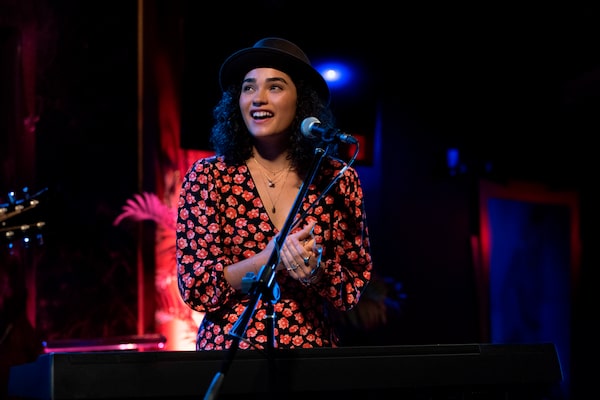Documentary Above the Law is a devastating indictment of the Calgary Police Service over racism and unnecessary police violence.Courtesy of CBC/CBC DOC
In the matters of anti-Black racism and police violence, there’s “them” and “us.” We see the United States as “them” and us, we’re not perfect but we are a better class of country. It’s delusional and the delusion runs deep.
Above the Law (Saturday, CBC, 8 p.m. on CBC Docs POV, and streaming on CBC Gem) is a devastating indictment of the Calgary Police Service in the areas of racism and unnecessary police violence. It is a must-see, a searing and deeply disturbing chronicle of arrests, beatings and killings that will make some viewers sick to their stomachs. This is one instance in which the on-air warning about disturbing material is warranted. But if you want to be familiar with what happens in this country when police violence goes unchecked, you need to brace yourself and watch.
Binge-watching guide: The recent shows you need to catch up on, all available to stream
It is a fact that the Calgary Police Service shoots and kills disproportionately high numbers of people, in some years, more than the Toronto, New York or Chicago police departments. The documentary drills deep into that fact by telling the intertwined stories of three separate people who were the victims of severe violence at the hands of Calgary police officers. And lest you think the program is a shrill denunciation, it isn’t; it’s wonderfully made and the thriller-like twist near its end is a scorcher.
One story is that of a man named Godfred. An immigrant from Ghana as a teenager, he’s seen in the documentary in Calgary’s East Village area on a cold day last year. It’s where he was dumped by local police in December of 2013, in freezing night temperatures. It’s where he was severely beaten by another police officer after he called 911, afraid he would freeze to death. There is footage of that beating and it is gruesome to watch.
The documentary focuses on the stories of three people who were the victims of severe violence at the hands of Calgary police officers.Courtesy of CBC/CBC DOC
Then there is the case of the young man in a hotel room. His family and hotel staff feared he was consuming drugs there and police went on a “wellness check” after hotel staff called them when he didn’t check out on time. Unarmed, he was shot four times and died. “Some constable decided to kill him,” a lawyer for the family says.
The other case studied is a young man who was in police custody and handcuffed. In a Calgary Police parking lot he was beaten so badly he suffered traumatic brain injury. Footage of that incident is also included and, again, it is difficult to stomach.
What links the three cases, as many lawyers and others suggest in the doc, is a police culture in which cops believe they are immune from investigation or punishment. They are free to do as they wish, as violently as they wish, and there will never be repercussions. Made by filmmakers Marc Serpa Francoeur and Robinder Uppal, who are originally from Calgary, the film was in postproduction when the COVID-19 pandemic stopped final work on it. Given the explosion of protest and public recrimination that followed the killing of George Floyd, the filmmakers and CBC ensured it was finished with urgency.
It’s not just timely, it’s a propitious reminder of our delusions about who we are and what we allow our police services to get away with. All of the now-familiar, soul-destroying narrative is here, right down to the new chief of police blathering about “bad apples” and barrels of apples.
Also airing this weekend
Little Voice (streams on AppleTV+ from Friday) is a lambent little treasure of a new series. If, that is, you are willing to fall for its sunny optimism and heartfelt love of music of the musical-theatre and sensitive singer-songwriter genres. The main character is Bess King (Brittany O’Grady) a talented but ultra-insecure singer-songwriter who is trying to muster the courage to sing and perform her own work in public. That’s it, really. That’s the gist. If you believe fully in the dreamy joy of creation and performance, it’s joyous escapism.

Little Voice tells the story of a talented but ultra-insecure singer-songwriter who is trying to muster the courage to sing and perform her own work in public.The Associated Press
Bess lives with her best friend Prisha (Shalini Bathina), another musician, who plays in an all-female mariachi band. Surviving through a string of gig-economy jobs such as dog-walking and waitressing – this is the most accurately realistic part of the show – Bess lives in New York City, where music is everywhere and she jots down lyrics for songs at every chance.
Thing is, Bess once performed at an open-mic night and it went disastrously awry. Ever since she’s been nervous about performing, even as she privately creates sweetly sensitive music. Featuring original music by Sara Bareilles, and directed mostly by Jessie Nelson – the two collaborated on the hit musical Waitress – Little Voice is an unusual series for these raucous times. The producer is J.J. Abrams and it bears more than a little resemblance to his early series Felicity. One advance review dismissed Little Voice as “twee,” but it’s more substantial than that. You need to hold a little idealism about music and performance to truly embrace it, but for some viewers that’s exactly what’s needed right now.
Plan your screen time with the weekly What to Watch newsletter. Sign up today.